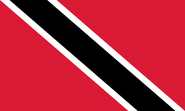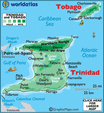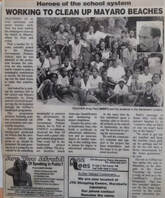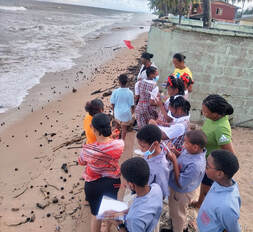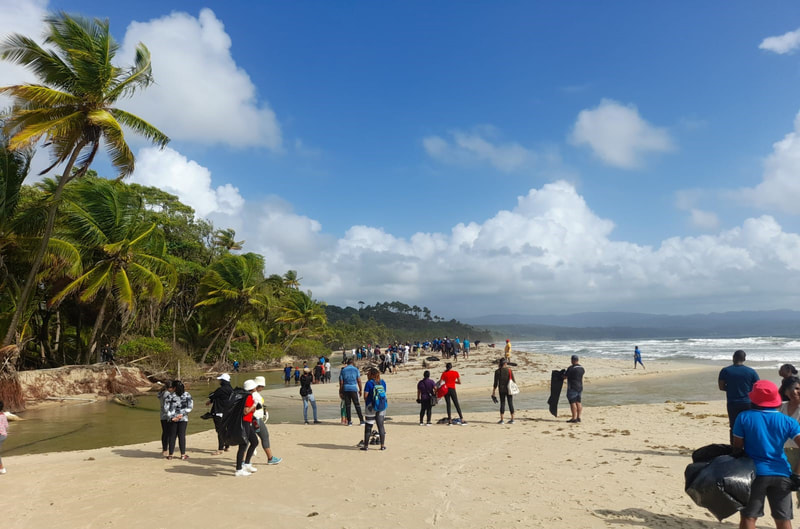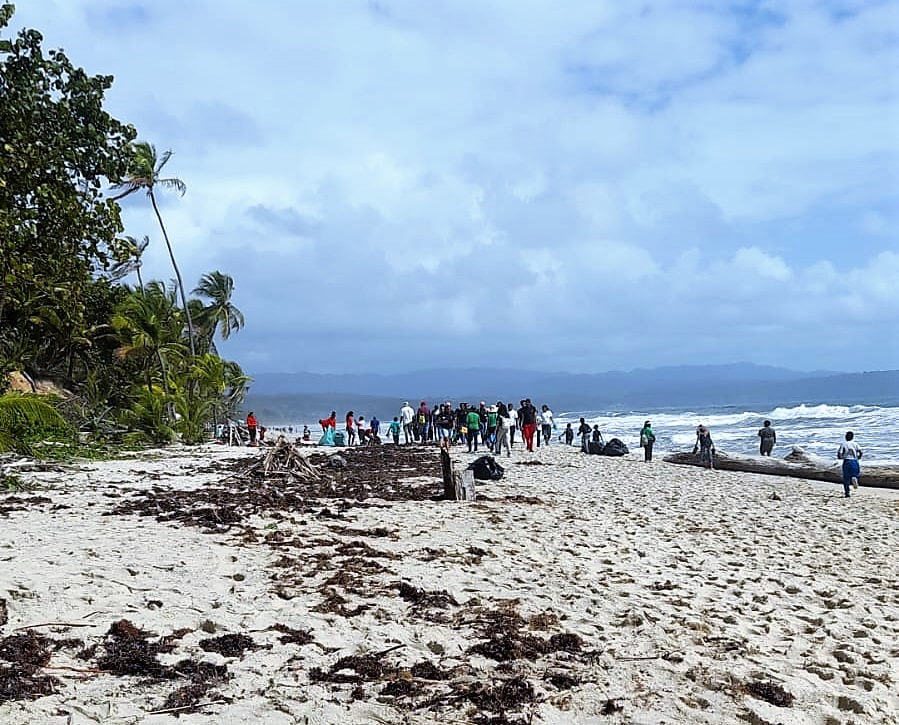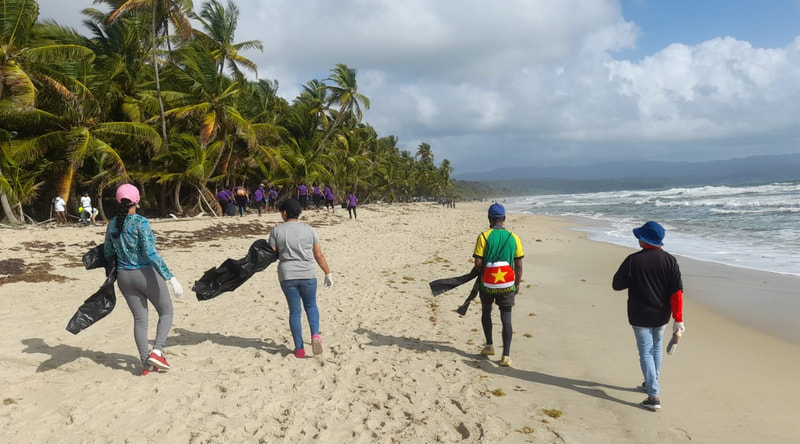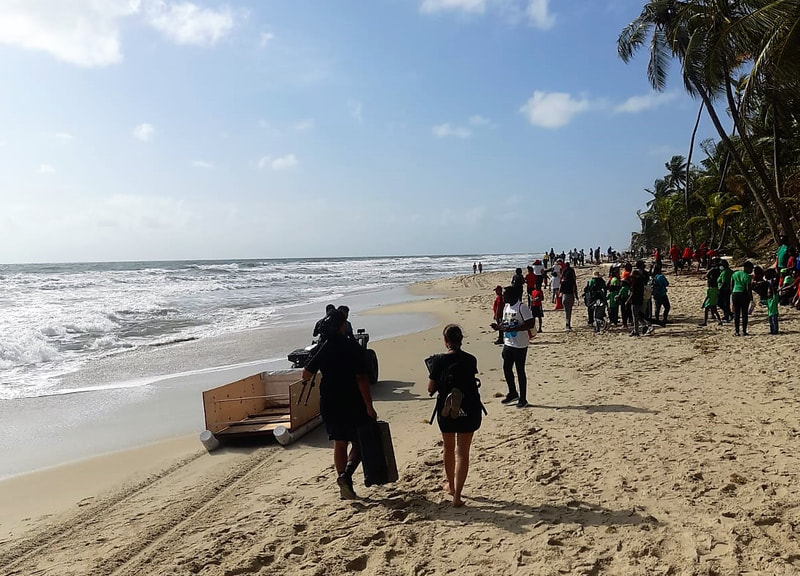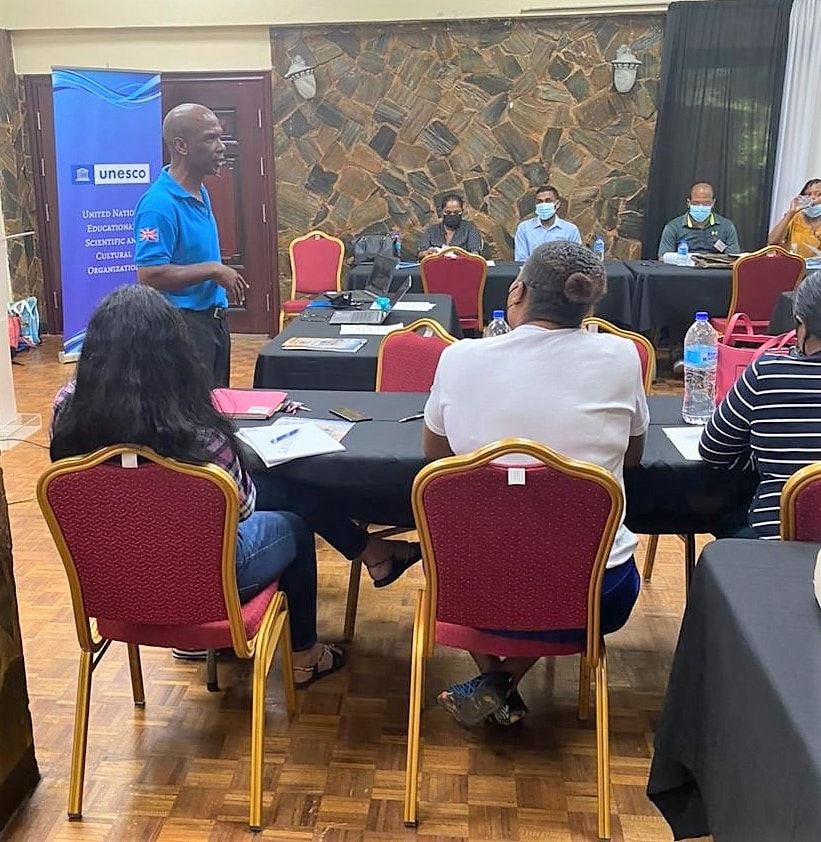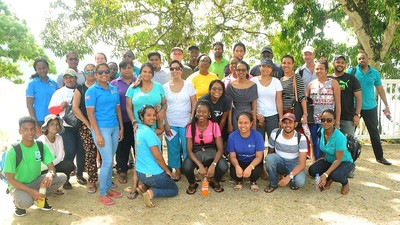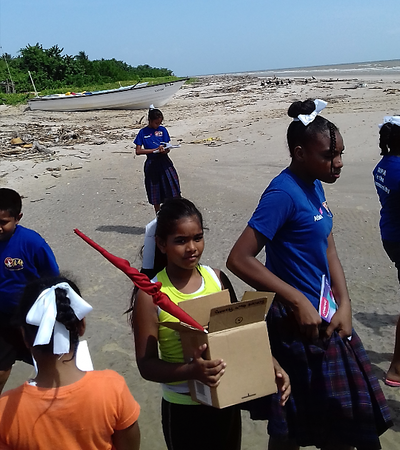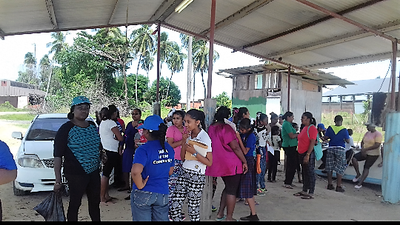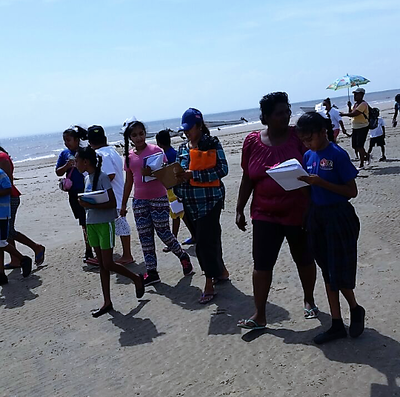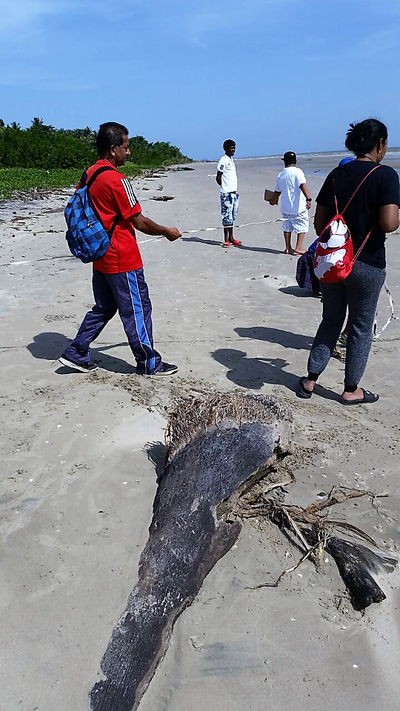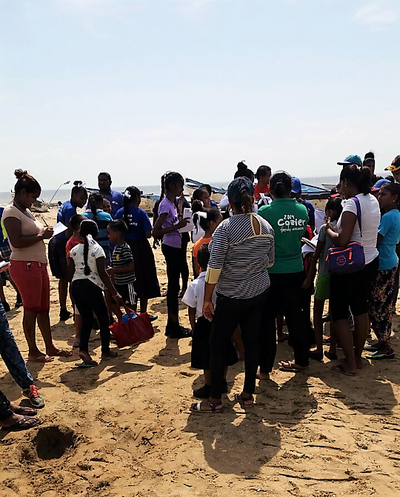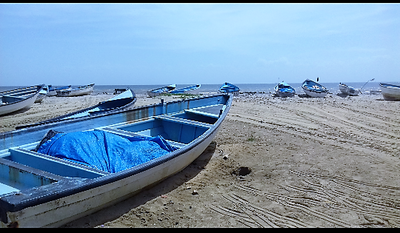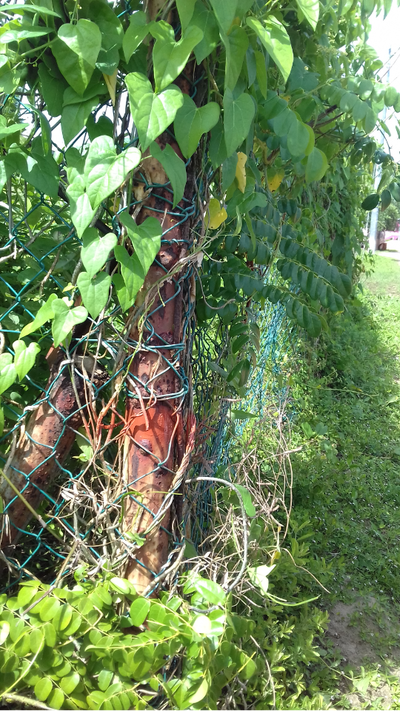Trinidad and Tobago
Sandwatch activities started in: 2001
Coordination of Sandwatch in Trinidad and Tobago:
|
Sandwatch in Trinidad and Tobago has been championed by Andy Paul, Principal of Mayaro Government Primary School. Other partners include the Trinidad and Tobago National Commission for UNESCO, and other schools including the Mafeking Government Primary School and Palo Seco Government High School. The Sandwatch group known as the “Mayaro Environmental Wave” have conducted exchange visits with Sandwatch groups in Brazil and the UK
|
Status of Sandwatch in Trinidad and Tobago: Active
Beach Records:
- Plaisance, Mafeking Government Sandwatch, 2021 - Click here
- Plaisance, Mayaro Sandwatch, 2021 - Click here
Activities and Highlights
|
Sandwatch Foundation Presents to The Caribbean Academy of Sciences
April 25th, 2024: The Sandwatch Foundation’s Regional Coordinator, Mr. Andy Paul (also Principal of Mayaro Government Primary School, Trinidad and Tobago) was asked by the The Caribbean Academy of Sciences to present a webinar entitled ‘Sandwatch: An Educational Tool for Sustainable Development’ The Caribbean Academy of Sciences – Trinidad and Tobago (CAS-TT) Chapter hosted a webinar on “Sandwatch: An Educational Tool for Sustainable Development” in collaboration with the DMME - Industrial Engineering Office of the Faculty of Engineering, The University of the West Indies (UWI). It was held via Zoom, from 1.00 p.m. to 2.30 pm on Thursday 25th April 2024. |
The seminar was supported by the Society of Caribbean Industrial Engineers (SCIE), the Technology and Engineering Management Society (TEMS) Chapter and the Education Society (EdS) Chapter of the IEEE Trinidad & Tobago Section.
The goal of this series was sought to facilitate a nation-wide awareness of recent issues and best practice approaches that would foster benefits of information and knowledge sharing and promote understanding, betterment, and quality of life in Trinidad and Tobago (T&T) and in a wider regional context. This was the second Seminar of the 2024 series. - Full details
The goal of this series was sought to facilitate a nation-wide awareness of recent issues and best practice approaches that would foster benefits of information and knowledge sharing and promote understanding, betterment, and quality of life in Trinidad and Tobago (T&T) and in a wider regional context. This was the second Seminar of the 2024 series. - Full details
|
Trinidad Sandwatchers take part in online Beach Records training
Trinidad and Tobago: On the 4th May, 12 interested teachers and students from Trinidad and Tobago participated in an online Beach Records training session. Prior to the session they visited Vessigny Beach and Plaisance Beach to collect the monitoring data. During the online training session they entered some of their data. A follow-up session was held on 18th May and the beach monitoring records for Plaisance Beach and Vessigny Beach can be seen at https://www.sandwatchfoundation.org/tt-br.html Please contact the Sandwatch Foundation if you would like to hear more about the online Beach Records platform and/or schedule an online introduction or training session. |
March 2023: Trinidad Sandwatchers clean beach and protect leatherback turtle nests
Wow, what a day it was. Mayaro Sandwatch was happy to be part of this event, organized by Nature Seekers, a non-profit organization who looks after the conservation and protection of the vulnerable Leather-Back turtles, in the Matura Bay. Nature Seekers engages volunteers to be part of a beach clean-up in preparation for the nesting season of turtles. The Matura Beach is a world renown nestling ground.
Over two thousand participants converged on this beach and removed 2600 kg of debris, from approximately 4 km of beach. The distance cleaned represented about 46% of this nesting beach. Yes, there is more work to be done.
Over 400 bags were collected, which comprised mainly of glass, Styrofoam, nets, ropes and plastics. With this campaign and the success of it, turtles will be happy to come “home” to nest. Let us ring in the nesting season and welcome the turtles for 2023. Photos below.
Wow, what a day it was. Mayaro Sandwatch was happy to be part of this event, organized by Nature Seekers, a non-profit organization who looks after the conservation and protection of the vulnerable Leather-Back turtles, in the Matura Bay. Nature Seekers engages volunteers to be part of a beach clean-up in preparation for the nesting season of turtles. The Matura Beach is a world renown nestling ground.
Over two thousand participants converged on this beach and removed 2600 kg of debris, from approximately 4 km of beach. The distance cleaned represented about 46% of this nesting beach. Yes, there is more work to be done.
Over 400 bags were collected, which comprised mainly of glass, Styrofoam, nets, ropes and plastics. With this campaign and the success of it, turtles will be happy to come “home” to nest. Let us ring in the nesting season and welcome the turtles for 2023. Photos below.
31st October 2022: Vessigny Secondary School, Trinidad and Tobago, commence Sandwatch
On 31st October 2022 the Sandwatch team from Mayaro Environmental Wave, led by Mr. Andy Paul, conducted a Sandwatch training session with 29 students and two teachers at Vessigny Secondary School.www.sandwatchfoundation.org/trinidad-and-tobago.html
The students were excited about Sandwatch. Three measurement points were established on the beach. A follow-up classroom session is scheduled for early November, after which the monitoring of the beach will take place monthly.
The monitoring data will be sent to the Sandwatch Foundation who will apply the results to fine-tune version 2 of the Beach Records Platform, which is scheduled to be launched January 2023.
Below: Students from Vessigny Secondary School monitoring the beach and measuring water quality. 31st October 2022.
On 31st October 2022 the Sandwatch team from Mayaro Environmental Wave, led by Mr. Andy Paul, conducted a Sandwatch training session with 29 students and two teachers at Vessigny Secondary School.www.sandwatchfoundation.org/trinidad-and-tobago.html
The students were excited about Sandwatch. Three measurement points were established on the beach. A follow-up classroom session is scheduled for early November, after which the monitoring of the beach will take place monthly.
The monitoring data will be sent to the Sandwatch Foundation who will apply the results to fine-tune version 2 of the Beach Records Platform, which is scheduled to be launched January 2023.
Below: Students from Vessigny Secondary School monitoring the beach and measuring water quality. 31st October 2022.
28th September , 2022: Sandwatch Training Workshop held in Mayaro, Trinidad
The following is a press release from the Trinidad and Tobago National Commission for UNESCO:
The Trinidad and Tobago National Commission for UNESCO hosted its second Sandwatch workshop on September 28, 2022, in the St. Patrick Education District, training an additional 27 teachers of both primary and secondary schools on the global environmental programme “Sandwatch”. The Sandwatch methodology links education to real-life issues such as climate change and teaches participants the importance of environmental education outside the classroom.
The Trinidad and Tobago National Commission for UNESCO hosted its second Sandwatch workshop on September 28, 2022, in the St. Patrick Education District, training an additional 27 teachers of both primary and secondary schools on the global environmental programme “Sandwatch”. The Sandwatch methodology links education to real-life issues such as climate change and teaches participants the importance of environmental education outside the classroom.
|
This series of environmental training workshops is very timely as climate change, biodiversity loss and the declining health of the ocean are affecting Caribbean coastal ecosystems in many ways. These changes include coastline erosion, beach debris and plastic pollution, ocean warming and acidification, and coral reef bleaching. With seventy percent of the Caribbean population living in coastal areas, the prospects for sustainable development in the countries are inextricably linked to a healthy and thriving marine and to environmental education.
In this context, UNESCO is developing a regional approach for participatory environmental education by developing the capacities of teachers, students, and local communities to work together to monitor and conserve the coastal and marine environment. Through this approach, UNESCO contributes to adaptation to climate change and ocean-related threats by building the resilience of natural ecosystems and of communities. The regional initiative is benefiting from a pilot in Trinidad and Tobago. The first workshop was held on June 9, 2022, in the South-Eastern Education District in the coastal community of Mayaro, where 30 teachers from primary and secondary schools, and curriculum officers from the Ministry of Education were trained. |
The level of technical and scientific environmental training that participants received will enable participants to not only develop skills to establish other Sandwatch activities but to also connect new schools into the existing Sandwatch network. With the rich environmental content participants also developed a deeper appreciation for our beaches, how critical they are to our eco-system and the need to protect them from the ravages of coastal soil erosion and climate change.
Sandwatch began in 1998 as a regional activity involving the Caribbean UNESCO Associated Schools Project Network. It has since grown into a global programme, actively implemented in more than 50 countries worldwide with the support of UNESCO, the Sandwatch Foundation, and several other partners. Sandwatch links classroom activities to real-life issues related to climate change, environment, sustainable development, cultural diversity, science and more. It links academic subjects across the curriculum from Mathematics and Natural Science to Social Studies and the Creative Arts. Most important of all, Sandwatch stimulates and encourages practitioners, young and old, to act by becoming involved in protecting their environment, and in understanding and influencing local government policy and action.
By 2025, UNESCO aims to integrate environmental education into the school curriculum.
Sandwatch began in 1998 as a regional activity involving the Caribbean UNESCO Associated Schools Project Network. It has since grown into a global programme, actively implemented in more than 50 countries worldwide with the support of UNESCO, the Sandwatch Foundation, and several other partners. Sandwatch links classroom activities to real-life issues related to climate change, environment, sustainable development, cultural diversity, science and more. It links academic subjects across the curriculum from Mathematics and Natural Science to Social Studies and the Creative Arts. Most important of all, Sandwatch stimulates and encourages practitioners, young and old, to act by becoming involved in protecting their environment, and in understanding and influencing local government policy and action.
By 2025, UNESCO aims to integrate environmental education into the school curriculum.
Sandwatch Workshop Photo Gallery
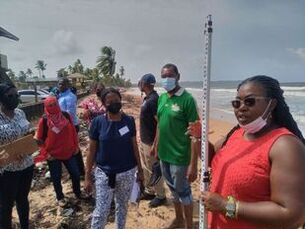
9 June, 2022: Sandwatch Training Workshop held in Mayaro, Trinidad
On 9th June 2022, 30 teachers from primary and secondary schools and three curriculum officers participated in a Sandwatch Training Workshop in Mayaro, Trinidad. The workshop was organised by the UNESCO National Commission for UNESCO and presented by Andy Paul of Mayaro Government Primary School. Representatives from the UNESCO Cluster Office for the Caribbean also attended. Plans are being made for further training workshops to be held in the school year starting in September 2022.
Click here for the workshop report and photographs
On 9th June 2022, 30 teachers from primary and secondary schools and three curriculum officers participated in a Sandwatch Training Workshop in Mayaro, Trinidad. The workshop was organised by the UNESCO National Commission for UNESCO and presented by Andy Paul of Mayaro Government Primary School. Representatives from the UNESCO Cluster Office for the Caribbean also attended. Plans are being made for further training workshops to be held in the school year starting in September 2022.
Click here for the workshop report and photographs
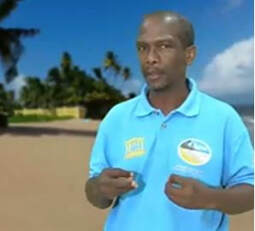 Andy Paul, Sandwatch trainer, took the participants virtually to the beach and gave insights into the training. He introduced the Sandwatch method Monitoring, Analysing, Sharing, Taking Action (M.A.S.T.)
Andy Paul, Sandwatch trainer, took the participants virtually to the beach and gave insights into the training. He introduced the Sandwatch method Monitoring, Analysing, Sharing, Taking Action (M.A.S.T.)
29 January, 2022: UNESCO: Sandwatch workshop held to promote resilient coastal ecosystems in Caribbean Small Island Developing States (SIDS)
To foster resilient coastal ecosystems, the National Commissions for UNESCO of St. Maarten, Curaçao and St. Lucia organised a Sandwatch Capacity Building workshop for UNESCO National Coordinators and ASP School Network Coordinators in the Caribbean SIDS from 17 to 19 January 2022. This three-day regional workshop targeted interested participants from government, academia, and ASP network coordinators to learn more about the Sandwatch programme and discuss how it can be revitalised in the Caribbean islands.
Andy Paul, Sandwatch trainer, took the participants virtually to the beach and gave insights into the training. He introduced the Sandwatch method Monitoring, Analysing, Sharing, Taking Action (M.A.S.T.) and prepared practical examples for observing and analysing the coastal environment, e.g. sand structure, beach vegetation, waves and currents.
Details on the workshop can be found here - Click here for the workshop report from Andy Paul
To foster resilient coastal ecosystems, the National Commissions for UNESCO of St. Maarten, Curaçao and St. Lucia organised a Sandwatch Capacity Building workshop for UNESCO National Coordinators and ASP School Network Coordinators in the Caribbean SIDS from 17 to 19 January 2022. This three-day regional workshop targeted interested participants from government, academia, and ASP network coordinators to learn more about the Sandwatch programme and discuss how it can be revitalised in the Caribbean islands.
Andy Paul, Sandwatch trainer, took the participants virtually to the beach and gave insights into the training. He introduced the Sandwatch method Monitoring, Analysing, Sharing, Taking Action (M.A.S.T.) and prepared practical examples for observing and analysing the coastal environment, e.g. sand structure, beach vegetation, waves and currents.
Details on the workshop can be found here - Click here for the workshop report from Andy Paul
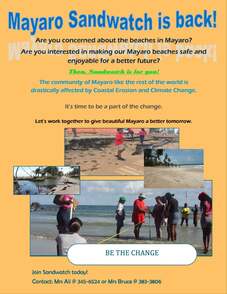
December 2021: Sandwatch Restarts in Trinidad 2022
Sandwatch has been active in Trinidad and Tobago since 2001 and has now been reactivated after covid restrictions were lifted. Sandwatch has been championed by Andy Paul, Principal of Mayaro Government School since the start of the program and has travelled around the world training other teachers in Sandwatch methodology. - View the "Sandwatch is Back!" promo video on their Facebook page here
Sandwatch has been active in Trinidad and Tobago since 2001 and has now been reactivated after covid restrictions were lifted. Sandwatch has been championed by Andy Paul, Principal of Mayaro Government School since the start of the program and has travelled around the world training other teachers in Sandwatch methodology. - View the "Sandwatch is Back!" promo video on their Facebook page here
November 2021: Two schools from Trinidad & Tobago register on the new Beach Records Platform
Two schools, Mayaro Government Primary School and the Mafeking Government Primary School, recently registered the beach of Plaisance on the newly created Sandwatch Beach Records Platform. To view their entries of Part 1 of the Beach Records form click here for Mafeking Government Primary School, and click here for Mayaro Government Primary School.
Two schools, Mayaro Government Primary School and the Mafeking Government Primary School, recently registered the beach of Plaisance on the newly created Sandwatch Beach Records Platform. To view their entries of Part 1 of the Beach Records form click here for Mafeking Government Primary School, and click here for Mayaro Government Primary School.
October 2017: Students at Icacos School start Sandwatch in Trinidad Sandwatch
The village of Icacos is situated at the south westernmost point in Trinidad and Tobago – at the tip of the Cedros peninsula. Icacos is just 7 miles away from neighbouring Venezuela and on a clear day one can see the Venezuelan coast. One of the main sources of employment is fishing. Fish can be bought straight off the boats that come ashore and fishermen often have stories to tell of their visits to the nearby Venezuelan islands. The first primary school in the area was built in 1877 and in 2008; a new primary school was opened to replace the old wooden structure. This school was one of the model schools to be built in the country. It is outfitted with modern amenities. The school provides a well balanced curriculum where academics, sports and other co-curricula activities are pursued with varying measures of success.
In October 2017, two teachers of the Icacos Government Primary School were given the opportunity to attend a Sandwatch training programme sponsored by UNESCO. They were housed along with persons from various countries as well as within Trinidad and Tobago.
There they learnt the purpose of “Sandwatch” in adapting to climate change and educating for sustainable development. The week long training entailed theory as well as practical work. Sandwatch is based on the MAST approach so participants learnt about Monitoring the beach, Analysing the results, Sharing the results and Taking action.
At the school, the idea of having our own Sandwatch programme was well received due to the fact that erosion was evident in Icacos. The Principal Ms Gail Alexander-Walters made the necessary arrangements for the programme to be undertaken. Members of the P.T.A, students, teachers and other interested persons showed their support by being part of the Sandwatch programme. The first Sandwatch exercise was done on the 9th November 2017, with 15 parents, 35 students and 3 members of staff. The students especially, were much thrilled to conduct the activities at the beach. The first trip to the beach entailed selecting the three reference points, measuring the width of the beach, checking wind direction and a few others.
We here at Icacos Government Primary School will continue with the Sandwatch programme and make it part of our culture at Icacos. We see Sandwatch as something beneficial to our coastal environment. It will also teach our students, residents and stakeholders to take care and practice sustainability.
The village of Icacos is situated at the south westernmost point in Trinidad and Tobago – at the tip of the Cedros peninsula. Icacos is just 7 miles away from neighbouring Venezuela and on a clear day one can see the Venezuelan coast. One of the main sources of employment is fishing. Fish can be bought straight off the boats that come ashore and fishermen often have stories to tell of their visits to the nearby Venezuelan islands. The first primary school in the area was built in 1877 and in 2008; a new primary school was opened to replace the old wooden structure. This school was one of the model schools to be built in the country. It is outfitted with modern amenities. The school provides a well balanced curriculum where academics, sports and other co-curricula activities are pursued with varying measures of success.
In October 2017, two teachers of the Icacos Government Primary School were given the opportunity to attend a Sandwatch training programme sponsored by UNESCO. They were housed along with persons from various countries as well as within Trinidad and Tobago.
There they learnt the purpose of “Sandwatch” in adapting to climate change and educating for sustainable development. The week long training entailed theory as well as practical work. Sandwatch is based on the MAST approach so participants learnt about Monitoring the beach, Analysing the results, Sharing the results and Taking action.
At the school, the idea of having our own Sandwatch programme was well received due to the fact that erosion was evident in Icacos. The Principal Ms Gail Alexander-Walters made the necessary arrangements for the programme to be undertaken. Members of the P.T.A, students, teachers and other interested persons showed their support by being part of the Sandwatch programme. The first Sandwatch exercise was done on the 9th November 2017, with 15 parents, 35 students and 3 members of staff. The students especially, were much thrilled to conduct the activities at the beach. The first trip to the beach entailed selecting the three reference points, measuring the width of the beach, checking wind direction and a few others.
We here at Icacos Government Primary School will continue with the Sandwatch programme and make it part of our culture at Icacos. We see Sandwatch as something beneficial to our coastal environment. It will also teach our students, residents and stakeholders to take care and practice sustainability.
October 2017: Sandwatch Regional Workshop held in Trinidad
Participants from countries in the Caribbean archipelago and South America met for a week’s workshop from October 2nd to 5th 2017, at the Radisson Hotel in Trinidad. This workshop, titled ‘Sandwatch: A Combined Citizen Science Approach to Climate Change Adaptation and Education for Sustainable Development’, was organised by UNESCO Headquarters, the UNESCO Kingston Office and the UNESCO National Commission for Trinidad and Tobago. Participants were educational and curricula professionals and some teachers.
On day one Ms. Sandra de Vries of the Netherlands and Ms. Debra Mc Fee of the Gender Issues Department of the University of the West Indies St. Augustine Campus, relayed experiences they encountered while trying to recruit members of different communities to become citizen scientists. The floor was then opened for questions and discussion. The rest of the day’s proceedings revolved around moderated group discussions on opportunities for the expansion of citizen science programmes within the Caribbean, with a focus on specific sustainable development goals. Day one concluded with an in-depth introduction to Sandwatch. Days 2 and 3 of the workshop foccused on Sandwatch activities at Las Cuevas Beach. Mr. Andy Paul and Mrs. Gourie Dukeran-Ali of Trinidad and Mrs. Michelle Stowe and Ms. Trachia Simmons of St. Vincent and the Grenadines trained the participants in Sandwatch activities including beach profiling, water and sand analysis, longshore current measurement and the measurement of human activities on the beach. Trainers from the Institute of Marine Affairs in Trinidad and Tobago demonstrated further beach profiling tools such as automatic levelling.
On the final day of the workshop Mrs Michelle Stowe demonstrated how the enter the information collected on the previous days into the Sandwatch International Database. Portraying Sandwatch through art was other activity. The workshop concluded with a lively discussion on how to merge and integrate the different aspects of the Sandwatch initiative into the education curriculum.
Michelle Stowe and Trachia Simmons.
St. Vincent & the Grenadines
Participants from countries in the Caribbean archipelago and South America met for a week’s workshop from October 2nd to 5th 2017, at the Radisson Hotel in Trinidad. This workshop, titled ‘Sandwatch: A Combined Citizen Science Approach to Climate Change Adaptation and Education for Sustainable Development’, was organised by UNESCO Headquarters, the UNESCO Kingston Office and the UNESCO National Commission for Trinidad and Tobago. Participants were educational and curricula professionals and some teachers.
On day one Ms. Sandra de Vries of the Netherlands and Ms. Debra Mc Fee of the Gender Issues Department of the University of the West Indies St. Augustine Campus, relayed experiences they encountered while trying to recruit members of different communities to become citizen scientists. The floor was then opened for questions and discussion. The rest of the day’s proceedings revolved around moderated group discussions on opportunities for the expansion of citizen science programmes within the Caribbean, with a focus on specific sustainable development goals. Day one concluded with an in-depth introduction to Sandwatch. Days 2 and 3 of the workshop foccused on Sandwatch activities at Las Cuevas Beach. Mr. Andy Paul and Mrs. Gourie Dukeran-Ali of Trinidad and Mrs. Michelle Stowe and Ms. Trachia Simmons of St. Vincent and the Grenadines trained the participants in Sandwatch activities including beach profiling, water and sand analysis, longshore current measurement and the measurement of human activities on the beach. Trainers from the Institute of Marine Affairs in Trinidad and Tobago demonstrated further beach profiling tools such as automatic levelling.
On the final day of the workshop Mrs Michelle Stowe demonstrated how the enter the information collected on the previous days into the Sandwatch International Database. Portraying Sandwatch through art was other activity. The workshop concluded with a lively discussion on how to merge and integrate the different aspects of the Sandwatch initiative into the education curriculum.
Michelle Stowe and Trachia Simmons.
St. Vincent & the Grenadines
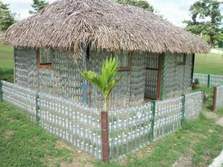
Sandwatch at Mayaro Primary, Trinidad
Sandwatch has resurfaced at the Mayaro Government Primary School. There are approximately thirty (30) students, three (3) teachers and some members of the public who are actively involved in the program. The group is involved in monitoring and data collection activities at the beach. We are presently in the process of conducting a recycling project using plastic waste materials to create useful and innovative items to be used in the environment.
- Please click here for details
Sandwatch has resurfaced at the Mayaro Government Primary School. There are approximately thirty (30) students, three (3) teachers and some members of the public who are actively involved in the program. The group is involved in monitoring and data collection activities at the beach. We are presently in the process of conducting a recycling project using plastic waste materials to create useful and innovative items to be used in the environment.
- Please click here for details
